Hello, Frank Indiviglio here. Among the world’s 2,000+ scorpion species we find creatures of every conceivable size, description and lifestyle – some deadly, others which make interesting captives for mature keepers. I had the good fortune to work with many during my zoo career, and most of the supplies that I relied upon then are now readily available to hobbyists. The following article will assist you in preparing for scorpion ownership or adding to your supply of scorpion care items. Most of the information is applicable to a wide array of species…please post below for more specific information about the scorpions in your collection.
Scorpion Terrariums
Scorpions are best kept in aquariums topped by screen covers secured with cage clips or plastic terrariums with locking tops. I favor deep or “extra-high”models for Emperor Scorpions and other burrowers, so that they can construct tunnels and caves.
Caves and hideaways designed for reptiles make ideal scorpion retreats. Cork bark is also ideal, and very versatile. I like to bury cork bark slabs below the substrate – Emperors evacuate burrows to them and will create a complex underground habitat if given enough space.
Plants
Many scorpions do great in complex, planted terrariums. I often use Earth Stars (Cryptanthus), a common house plant that is very sturdy and thrives in low-light conditions. Please post below for information on other live plants that can be used in scorpion enclosures.
Substrate
A mix of coconut husk and peat moss or top soil works well for Emperor Scorpions other rainforest natives. For burrowers, add just enough water so that the substrate sticks together when squeezed…keeping it so will help to prevent tunnel walls from caving-in.
Scorpions that are native to arid habitats can be kept on a sand-gravel substrate.
Light
Red reptile night bulbs do not disturb scorpions and so will allow you to watch their nocturnal activities.
Heat
Most scorpions thrive at temperatures of 76-86 F (please post below for specific information, as needs vary among the different species).
Red/black reptile night bulbs or ceramic reptile heaters can be used to warm the terrarium. Reptile heat pads and tapes should also be considered, but these often do little to heat the air. All heat sources will dry out the terrarium, so it is important to monitor humidity.
Proper humidity levels are critical to good health, normal activity and successful shedding. A hygrometer (humidity monitor) is an essential piece of equipment for the serious scorpion keeper. A reptile humidifier or mister will be useful in dry rooms; otherwise you can rely upon a hand-held mister.
Tropical forest species require humidity levels in the range of 75-85%, while those native to arid habitats do best at 40-50% humidity. Desert-dwelling scorpions spend much of their time in humid burrows, and should therefore be provided a cave stocked with damp sphagnum moss.
Food and Water
Most scorpions will thrive on a diet comprised of crickets, mealworms and earthworms. I’ve also offer wild-caught insects, roaches, waxworms, and other invertebrates as well, and believe this is key to the long-term health and breeding success of some species.
Canned grasshoppers and silkworms moved about with a long-handled forceps are an excellent source of dietary variety.
Scorpions obtain water from their prey, but should also be provided with a shallow water bowl.
Miscellaneous Supplies
Always use forceps to offer food, remove debris, re-arrange terrarium furnishings, and prod scorpions into carrying containers. Small nets should also be kept on hand.
Extra plastic terrariums can be used to isolate aggressive or injured individuals.
Super glue and petroleum jelly are sometimes useful in treating exoskeleton cracks and other injuries. Please see the cautions noted in the article linked below, and post below for information before attempting to care for an injured scorpion.
Further Reading
 That Reptile Blog – Reptile, Amphibian and Exotic Pet Care and Information
That Reptile Blog – Reptile, Amphibian and Exotic Pet Care and Information


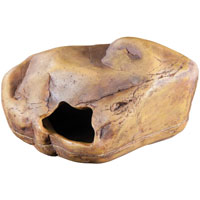
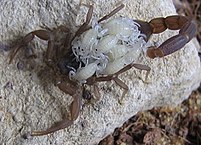
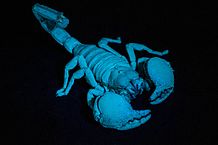
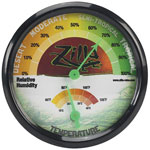
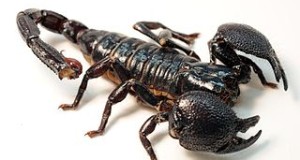
Hello:
I have a female Emperor Scorpion and I live in the Florida Keys do feel that I should have a
heat pad or heat lamp in the aquarium or is my tropical area warm enough?
Thanks,
David
Hello David,
Wishing I were in the Keys now,,,still below freezing at night here near NYC! They do best at temperatures of approximately 78-86F; please see this article and let me know if you need more info, best, Frank